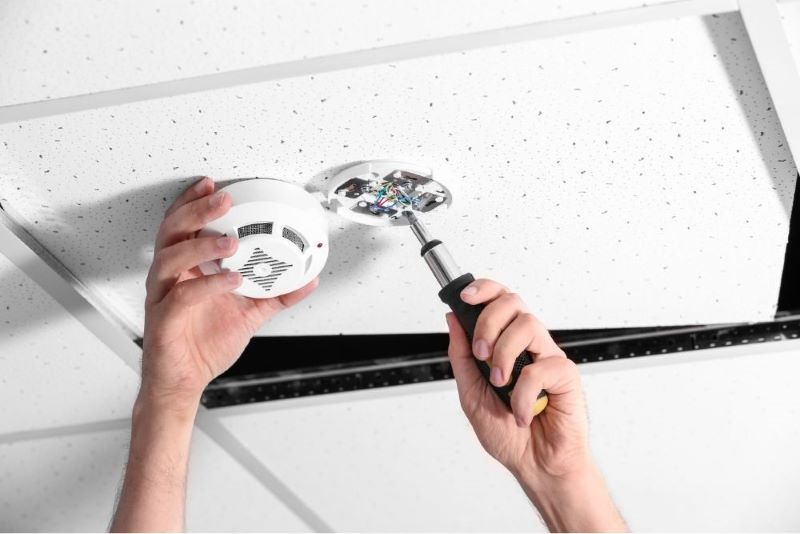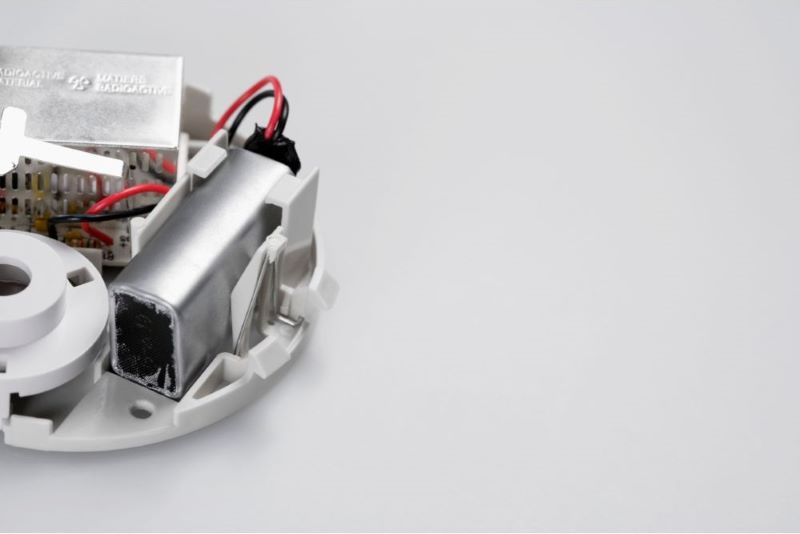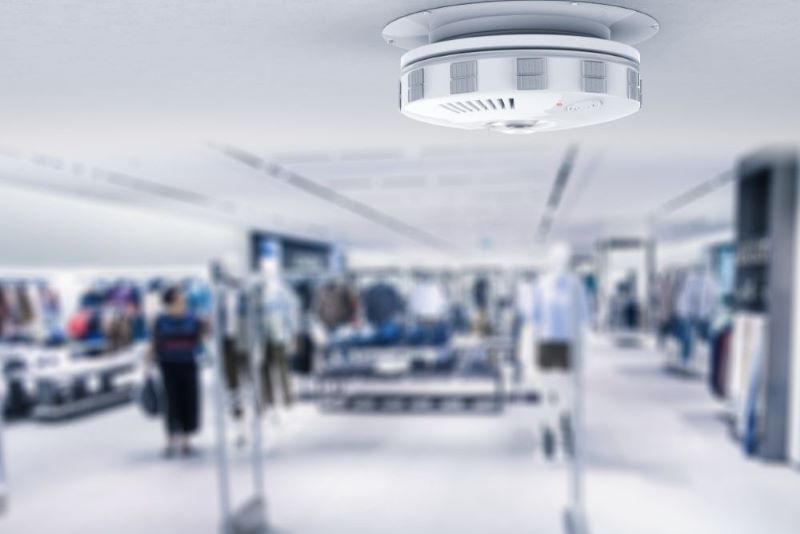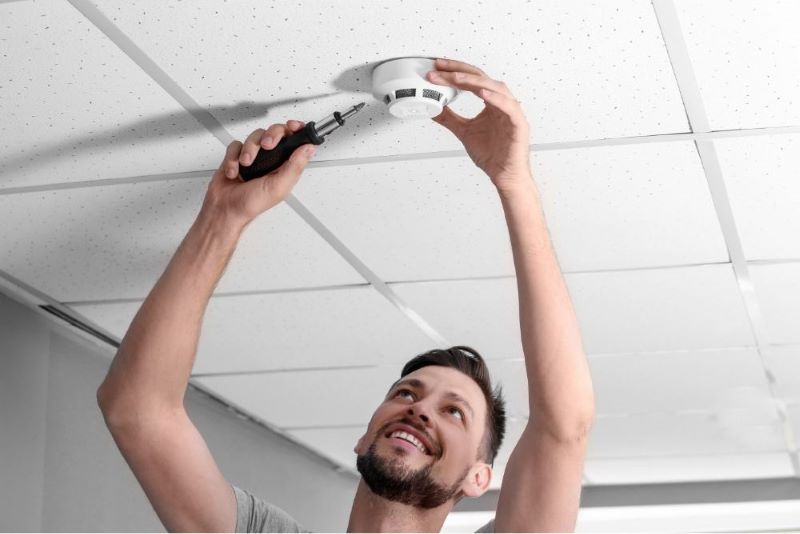A property’s smoke alarm device is an essential component of any fire safety plan because it can promptly notify you of any potential fire risk or hazard. However, a false alarm might be bothersome, particularly if it continually releases a high-pitched chirp. Why would smoke alarm go off without smoke? Why does it happen?
How do Smoke Alarms Operate?
When trying to figure out the possible reasons for false alarms on your property, it can be helpful to understand how smoke alarms operate.

There are primarily two types of smoke alarms: ionization and photoelectric. Photoelectric smoke alarms function with a constant light beam. When smoke particles get into the device’s internal chamber, they scatter the light and guide it toward a photocell, which sets off the alarm. On the other hand, ionization smoke is a detection method that uses electrons and ions that fly around electrodes. Smoke adheres to the ions in the ionization chamber when it enters, changing the chemistry and setting off the alarm.
When smoke enters the chamber, either type of smoke alarm will trigger; yet, both are prone to malfunctions. These malfunctions may be caused by subpar construction, sensitive smoke detectors, or environmental influences that interfere with the device’s operation and set off false alarms.
Reasons Why Would Smoke Alarm Go Off Without Smoke
The most common reasons why would smoke alarm go off without smoke are listed below:
Batteries

Your smoke alarm will alert you to the need for new batteries if it is blaring. Make sure you replace the batteries as often as the manufacturer recommends, which is usually every six months unless you have selected one that has a lifetime battery.
Candles
Though it is rare, especially if the candle is placed promptly underneath the smoke alarm, most commercially made candles do not emit enough smoke to set off a smoke alarm. If you have a lit candle and your smoke alarm goes off, move it somewhere else or blow it out.
Dust Buildup
For this reason, professionals advise cleaning the smoke alarms with a vacuum brush attached at least once a year, if not more, as the buildup of dust may disrupt your smoke alarm.
Electrical Problems
Your smoke alarm may behave strangely if the wiring is defective. Plan routine maintenance if your alarms are hardwired so that any electrical problems can be addressed.
Fireplace
During the colder months, fireplaces are an excellent way to heat your property and create a warm atmosphere. However, there may be enough smoke in the property to set off the smoke alarm if smoke particles do not entirely leave through the chimney.
High Humidity
Dense moisture particles generated by high humidity may confuse your smoke alarm into thinking they are smoke particles. Because of its density, the air can sometimes cling to the ions in an ionization chamber or scatter the light beam of a photoelectric sensor.
Location of the Smoke Alarm

The alarm can be set off with very little smoke. One possible reason for your false alarms could be that the smoke alarm is located less than ten feet away from a cooking item, like your stove, toaster, or microwave oven.
Some of the more advanced photoelectric smoke alarms can even sense an abrupt temperature increase. Another common cause of bothersome alarms is placing the smoke alarms next to windows or doors. When particles from outside the room drift in, the draft may block the sensors’ ability to function properly and even give a sense of smoke.
Steam
Your detector may confuse steam for smoke if it is placed too close to a bathroom. A smoke alarm should ideally be placed in hallways or other shared spaces close to beds to prevent this.
Overcooked Food

Try testing and adjusting the sensitivity of your alarm if it continues to sound every time you cook even when it is placed more than ten feet away from your cooking appliances. If it continues you need to learn how to change the sensitivity.
Smoke Alarm’s End of its Useful Life
Smoke alarms typically last eight to ten years. Your fire alarm may be nearing the end of its useful life if it is chirping and older than seven years. Concerned about the age of your smoke alarm? Look for a manufacturer’s date on the back of it.
Strong Chemicals
Strong-smelling chemicals may release airborne particles that trigger smoke alarms. Your alarms can be coming from intensive cleaning, rebuilding your property, or using strong chemicals.
Unwanted Insects and Bugs
Check your smoke alarm. Can you see the openings in the chambers where smoke will enter? Just a little insect or bugs could fit inside of them.
Insects and bugs can interfere with the sensors once inside and trigger an alarm. You might want to check inside your smoke alarm to see if there a bothersome insects or bugs living inside.\
Smoke Alarm Ideal Placement
Placing smoke alarms in the right places throughout the property is one of the best ways to cut down on false alarms. Its proper location is everything. The following are some basic advice:
- If there is a fire, bedrooms and corridors are great places to be because they can alert you quickly, especially while you’re sleeping. To avoid steam-triggered alarms, keep them at least 10 feet away from bathrooms.
- Keep your placement away from your kitchen, as cooking smoke is a significant cause of problems there. Place them somewhat outside of the kitchen area instead to guarantee fire detection without setting off false alarms.
- As dust and insects tend to gather in corners, placing smoke alarms on high ceilings can help keep them safe from these things.
If you have followed all of the above advice and the reasons listed above still don’t explain why would smoke alarm go off without smoke, it may be time to speak with professionals. Given the complexity of smoke alarms, it is advisable to leave repairing electrical or sensor-related problems to professionals.


